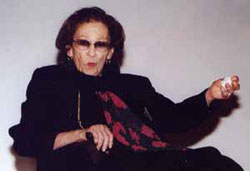BookTalking with Maxine Greene
Maxine Greene, the William F. Russell Professor Emeritus in the Foundations of Education and Professor Emeritus of Philosophy and Education, continues to flunk retirement. Not only does she teach a class at TC each semester, but she also published another book, Variations on a Blue Guitar. On January 29th, at the American Museum of Natural History, she discussed it with Richard Heffner at the latest TC BookTalk event.
The book, which was written about in the last issue of TC Today, is a collection of lectures on aesthetic education that Greene has given over the past 25 years at the Lincoln Center Institute of Arts and Education, where she is philosopher-in-residence. The approximately 30 lectures contained in the book define aesthetic education and explain how it can transform teachers, students, schools and communities.
"I wanted to make aesthetics entirely accessible to public school teachers who may never have had a class in philosophy," Greene told the audience. Aesthetic education, she added, empowers someone to make a work of art meaningful. Unlike art appreciation, which is learning dates and styles, aesthetic education is a more personal relationship with the art form.
"It is an awareness of the human condition that you share with other human beings," Greene explained. "It brings you in touch with something universal."
The BookTalk discussion turned to art as a response to the events of September 11th. Greene talked about the need for people to "find their voices after this horror," through painting, writing and poetry.
"I was asked by Nancy Shapiro what to do about the destructive imagination," Greene said. "It took imagination to fly the plane into the tower. Auschwitz took imagination. Engagement with literature and paintings help you define yourself in a world as uncertain as this one."
She shared that she had a daughter who died, and one year later, on her daughter's birthday, she decided, in her grief, to see a film. "It was the official story of Argentina at the time of the disappeared children," Greene explained. She said that after seeing the film she thought, "I can't say, why me? Why not me? I felt I became part of some human family."
"You open your heart and mind to people you never knew," she added, "and you are larger for it."
Heffner asked Greene to expound on how her aesthetic side has exhibited itself in political matters. Greene noted that most conversation is trivial, and engagement with the arts opens conversations to deeper levels. "Politically, the more we can encourage communication about things that are important to us and the people around us, the more we feel ourselves to be individual beings."
Heffner then asked if her politics had changed over the years.
"I was dumb when I was young," she replied. "I wished I could have been in the Spanish Civil War. My politics were romantic."
She went on to say that from what she knew about Franklin D. Roosevelt, his was the kind of government she wanted to see. Greene focused mostly on current politics by saying, "It is something in this society which moves people to make other people 'other.'"
As a Jewish woman reflecting on anti-Semitism, she said one can never say, "We are all right now." As a retired professor who continues to be active in academia, she commented on ageist questions that are posed to her, such as, "You are still teaching?"
Reflecting on feminism, she shared how "the image of beautiful young women in Afghanistan crowding to go to university," made her feel "cheap making demands when you see what women in other worlds are going through….We have to realize how lucky we are for the opportunities and rights we have that we never expected."
Greene admitted that it is difficult for teachers today, and that she would like to see schools and classrooms that would create communities that are more democratic and committed to freedom of speech and creativity. "If kids see themselves growing up in that culture, they see themselves becoming what they never thought they could."
Her book is not an answer, she said, but a journey, which she continues to make in her quest "to see things as if they could be otherwise."
Published Sunday, May. 19, 2002
